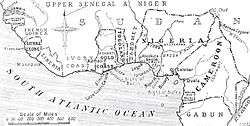Adubi War
The Adubi War (known locally as Ogun Adubi or Egba Uprising) was a conflict in June and July 1918 in the British Colony and Protectorate of Nigeria ostensibly because of the imposition of colonial taxation.[1] Direct taxes were introduced by the colonial government along with existing forced labour obligations and fees. On 7 June, the British arrested 70 Egba chiefs and issued an ultimatum that resisters should lay down their arms, pay the taxes and obey the local leadership.
The War
On 11 June, a party of soldiers, recently returned from East Africa, were brought in to help police the area and keep the peace. On 13 June, Egba rebels pulled up railway lines at Agbesi and derailed a train. Other rebels demolished the train station at Wasinmi and murdered the British agent; the Oba Osile, the African leader of the north-eastern Egba district.[2] Hostilities between the 30,000 rebels and colonial troops continued for about three weeks at Otite, Tappona, Mokoloki and Lalako but by 10 July, the rebellion had been put down and the leaders killed or arrested.[2]
Aftermath
About 600 people were killed, including the British agent and the Oba Osile, although this may have been due to a dispute over land and unconnected to the uprising.[3] The incident led to the abolition of Abeokutan independence in 1918 and the introduction of forced labour in the region; imposition of the direct taxes was postponed until 1925.[4][5] British soldiers who repressed the revolt received the Africa General Service Medal.
Footnotes
- Oduntan 2010, p. 218.
- Hogan 2013, p. 304.
- Oduntan 2010, pp. 219, 231, 220.
- Falola & Genova 2009, pp. 110–111.
- Hogan 2013, pp. 299–313.
References
- Falola, Toyin; Genova, Ann (2009). Woronoff, Jon (ed.). Historical Dictionary of Nigeria. Historical Dictionaries of Africa. CXI. Lanham, MD: Scarecrow Press. ISBN 978-0-8108-5615-8.
- Hogan, Edmund M. (2013). Cross and Scalpel: Jean-Marie Coquard Among the Egba of Yorubaland. Portsmouth, NH: Heinemann Educational Books. ISBN 978-978-081-287-4.
- Oduntan, Oluwatoyin B. (2010). Elite Identity and Power: A Study of Social Change and Leadership among the Egba of Western Nigeria 1860–1950 (PDF) (PhD). Halifax, Nova Scotia: Dalhousie University. pp. 218–232. OCLC 812072776. Retrieved 12 November 2017.
